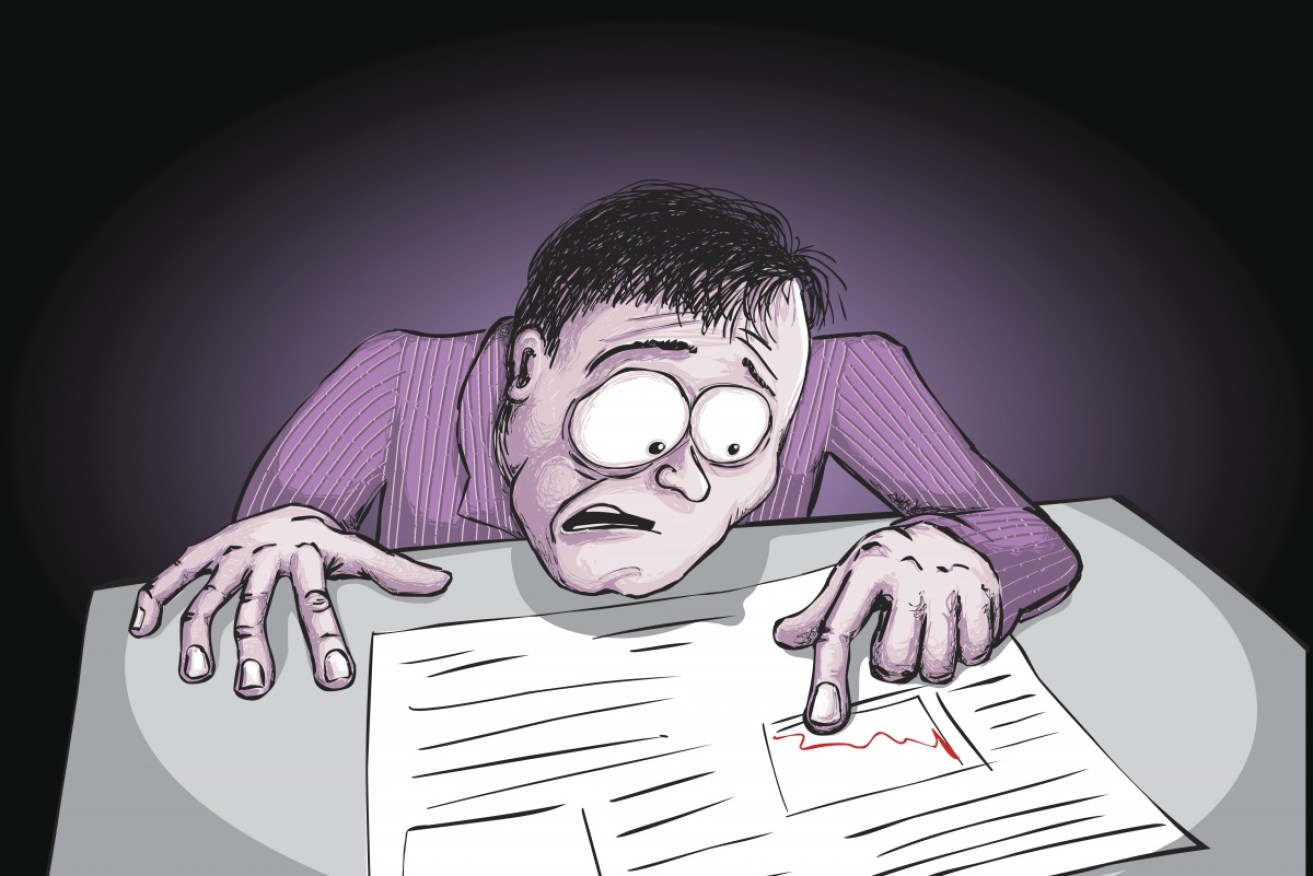Here’s how to pick winning stocks: don’t

We feel losses too deeply to do it well. Photo: Getty
Australian stocks may have suffered one of the biggest one-day plunges since the market chaos of Brexit, but you shouldn’t panic.
The ASX lost about $34 billion in market capitalisation on Monday following comments from a US Federal Reserve official that a September rate rise might be warranted. It continued a downtrend trend since August 24.
The All Ordinaries index, which tracks the 500 biggest companies on the ASX, fell 121.4 points (2.3 per cent) to 5319.1. The ASX 200 index likewise fell 2.3 per cent (119.6 points) to 5219.6.
One of the big losers was the National Australia Bank, which fell 70 cents (2.5 per cent) to $26.60. Commonwealth Bank shares also fell 65 cents (0.92 per cent) to $70.22 – its lowest price since February.
The news is probably most frightening if you invest directly in the market. Perhaps you own Qantas, BHP or one of the bank shares that copped a hiding. That would put you in good company. About 16 per cent of Australian stocks are held directly by households, the RBA estimated in 2010.
But according to Bond University finance expert Dr Simone Kelly, non-expert investors should, as a general rule, ignore these fluctuations entirely.
“The general lay investor, by the time they’ve seen the market fall, it’s too late. They are going to sell at the bottom of the market and then when the market goes up again, they’re going to be buying at the height of the market,” Dr Kelly told The New Daily.
“They are much better to ignore that little blip.”
Dr Kelly said the only exception to this rule would be a catastrophic event, such as a nuclear strike by North Korea on half the world.
‘Trading is hazardous to wealth’
Unfortunately, the lay investor routinely ignores this advice. In fact, we are notoriously bad at stock market investing in general. We are spooked by losses. We fail to account for fees. We hold small numbers of stocks rather than a diverse portfolio. And we follow the market like sheep.
For example, according to a 2008 study published in The Review of Financial Studies, individual investors are more likely to buy and sell when everyone else is buying and selling (on high-volume trading days) and when stocks are in the news compared to investment experts.

You’ll probably feel better if you stop reading daily stock prices and adopt a long-term view. Photo: Getty
The same study found that a sample of US households invested in the market held an average of 4.3 stocks and a median of 2.61 – certainly not enough to adequately diversify risk.
Another study, published in The Journal of Finance in the year 2000, found that “trading is hazardous to your wealth”. Its findings were based on a sample of 66,465 US households. The most active traders underperformed the market (by an average annual return of 6.5 percentage points) and underperformed less active traders.
Lay investors are also notoriously preoccupied with short-term volatility. This is thought to be a result of “myopic loss aversion”, a theory identified by Benartzi and Thaler in 1995, which says we check our returns frequently and suffer greater pain when we see losses than we get enjoyment when we see gains.
This short-term preoccupation may also be explained by the “overreaction hypothesis”, which says investors and traders react disproportionately to new market information compared to preexisting information.
‘Get out of the market’
For these reasons, Dr Kelly had very simple advice for the average investor: don’t try to pick stocks.
Instead, consider putting your money in a managed investment fund; contribute extra to your superannuation fund (which probably invests heavily in the Australian stock exchange); or buy a market index.

You’re probably better off looking at fund performance rather than pouring through company reports and prospectuses. Photo: Getty
“If you are accumulating wealth for retirement, you’re more likely to kill yourself with a heart attack than you will make money. You will actually go backwards because you’ll be so worried,” Dr Kelly said.
“There’s even evidence that professionals shouldn’t manage their own money because they worry so much about errors that they make. They can manage other people’s money, just not their own.”
Dr Kelly said the best use of an average investor’s energy is not in picking stocks, but in carefully researching the long-term (five- and 10-year) track record of fund managers.
“They should be investigating, if they are going to give their money to someone to invest for them, they should spend their time and resources looking at the quality of the people they are giving it to.”
And if you really want the thrill of picking stocks, Dr Kelly suggested putting 95 per cent of your investment in a safe option like a market index, and then using the remaining 5 per cent as “play money” on speculative picks that you are happy to lose.








